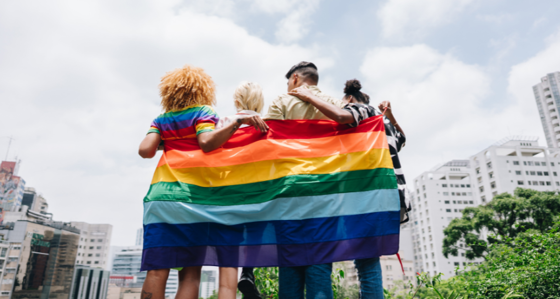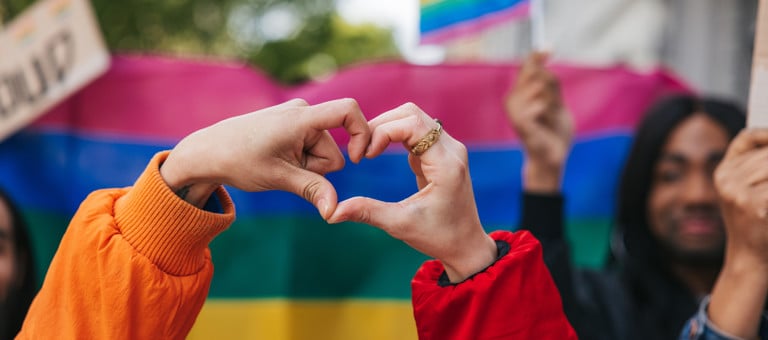If I were to imagine the ‘corporate code’ personified, it would be a middle-aged man in a suit, having a large, carrying voice, and a penchant for formality and tradition. To me, he represents the status quo of mainstream, corporate America, which tends to want to preserve the established order.
Fortunately, Baringa has broadened my understanding of what’s possible by creating a space filled with diverse and kind individuals who provide me with the opportunity to bring my whole self to work.
Knowing how to fit in
At 14, I left my home nation of Canada to go to the US and pursue my passion for ice hockey. I have spent the larger part of my life involved in sports and as I entered the workforce it was clear to me that the athletic and corporate worlds are shaped by a similar code. I spent most of my younger years striving to earn my place on a roster, adjusting to different coaching styles and trying to fit into different team dynamics. Those experiences have helped me better recognize and understand the ‘code’, either written or unstated, in an organization, and how to adapt, perform, and work within its boundaries.
In terms of the authenticity gap – the difference between who I truly am and what the code says I should be – I would say that I sit squarely in the middle.
For the most part I can fit in, and I aim to recognize my privilege in the spaces that I occupy as a white, cisgendered female. However, as a member of the LGBTQ+ community who has stepped into many male-dominated spaces throughout my career – as a hockey player, engineer, and consultant – one could say, I’m clearly ‘off-code’.
Mitigating risks
I feel this dichotomy most acutely in client spaces. In those situations, I have to be mindful of the person I’m presenting in order to ensure I’m respected. There’s a fear that if I open up to a person about who I am, I’ll make myself vulnerable and at risk of being shut out from doing my job.
In recent years, corporate America has made significant strides in understanding the importance of diversity, equity, and inclusion (DEI) within its workforce. Yet, despite this progress, the journey toward genuine equity remains an ongoing challenge. Many continue to grapple with systemic barriers, unconscious biases, and insufficient representation in leadership roles.
Throughout my career I have had the privilege of building many strong relationships and of experiencing a high rate of acceptance but I’m very aware that is not the case for everyone.
A space to regenerate my genuine self
Thankfully, Baringa has put significant efforts towards embracing varied perspectives and backgrounds by implementing inclusive policies and establishing equitable opportunities for underrepresented groups. They’ve provided a space for which I can reenergise, talk to my coworkers, and then hit the next project with confidence. Essentially, a space to regenerate my genuine self.
Growing a circle of authenticity
I’m still developing, both in my career and personal life. I used to think that I had to have one persona at work and another persona at home. But, over the last year, Baringa has given me the space to bring all of who I am to work.
I have been fortunate to grow up, play, and work in spaces that have been accepting of who I am. However, there are many people, of all genders and orientations, who have never experienced acceptance or support, both at home and at work.
I aim to not only be a role model to younger members of the community, but to all professionals who fear the consequences of authenticity. I feel I have a responsibility to let people see that there is a safe space available to them, because I live and thrive in it.
As I see it, the code is a relative concept, each of us having our own individual reaction to it. A powerful first step towards rewriting the code is to be aware of it, recognise what it means to us personally, and accept that it may mean something different to your colleague. Only then can we react more consciously and with intention, striving towards a work environment where every space feels safe.
More from this series

Boundaries to protect myself and the way I work
Joel Loong, expert in Energy and Resources in Singapore discusses neurodiversity at work and championing your personal ways of working for success.
Read more
The right cheerleaders at the right levels
Jasmin Jenkinson, expert in Energy and Resources, talks on disclosing sexuality at work and how Baringa has grown and how it can continue to champion authenticity.
Read more
Aspiring to be me, not one of many
Tyrone Salami, expert in Central Government, discusses assimilating in the workplace as a black male. How the gap between authenticity and conforming can be disproportionate from one group to another, and explains how creating spaces to listen at Baringa is going some way to shrink those gaps.
Read more
Chris Nott on social mobility: hiring people, not profiles
Chris Nott, Partner in Financial Services in Australia, discusses the importance of hiring a person, not a social background and how Baringa has evolved over 15 years.
Read moreRead our Personal Journeys blog

Diversity and inclusion: personal journeys
A series of reflective pieces where brilliant people from within Baringa will share their journeys as individuals or members of our company and community.
Read more


Why I am talking to white people about race
Introducing Jennifer Cook, an expert in organisational and operational transformation and a leader in Baringa’s Ethnic Diversity Network
Read more